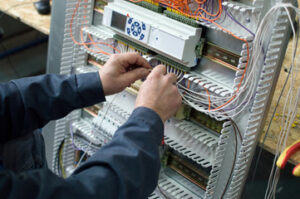HVAC systems regulate the temperature and humidity in a building. They are important in large office buildings, residential structures, hospitals, vehicles, and marine environments. These systems use a network of ducts to move air throughout the building. Some systems also do not use ducts and use mini-ducts to move air. Regardless of your system type, it will help you control the indoor air quality of your home. Here are some important things to know about HVAC systems.
 Maintenance and repairs: HVAC systems require regular maintenance to function properly and efficiently. The most common cause of system breakdowns is poor maintenance. It is important to have a professional HVAC technician come out and check your system regularly. HVAC technicians typically perform maintenance checks twice a year. HVAC will check the blower fan’s operation, the coolant level in the cooling system, and the thermostat. They may need to adjust the thermostat or replace a part if necessary.
Maintenance and repairs: HVAC systems require regular maintenance to function properly and efficiently. The most common cause of system breakdowns is poor maintenance. It is important to have a professional HVAC technician come out and check your system regularly. HVAC technicians typically perform maintenance checks twice a year. HVAC will check the blower fan’s operation, the coolant level in the cooling system, and the thermostat. They may need to adjust the thermostat or replace a part if necessary.
Apprenticeships: HVAC technicians learn on the job while working on HVAC systems. Apprenticeships typically last three to five years and can give you hands-on experience. Local associations offer apprenticeships and last anywhere from three to five years. You can begin your apprenticeship by working as an unpaid intern for a journeyman. Apprenticeships are a great way to learn about the field while building a network of contacts in the industry. These relationships can also be beneficial for your career prospects.
Reference materials: ASHRAE has several publications, including the Fundamentals Handbook, which calculates heating and cooling. In addition to ASHRAE’s Handbook, HVAC engineers can consult ACGIH and technical trade journals to improve their knowledge. If you want to become an HVAC professional, consider becoming a member. You will have a network of like-minded professionals dedicated to improving the air quality in buildings.
Education: Becoming an HVAC technician often begins with a vocational or post-secondary school. For example, Career College’s HVAC program prepares students for entry-level HVAC positions within ten months. Some HVAC technicians go straight to the job, which requires much longer. Other individuals choose to train in an apprenticeship. Apprenticeship programs are longer but also require a lot of hands-on learning.
HVAC systems provide comfort and indoor air quality to occupants of a building. Different HVAC systems have different purposes. For example, a central HVAC system uses a single blower to circulate air throughout the building. These systems can be used to control the temperature in different zones. If you want to improve the indoor air quality in a building, HVAC systems are an excellent choice. There are many benefits to having an HVAC system. They will make your building more energy efficient and improve the comfort level of everyone inside it.
In addition to heat and cooling equipment, HVAC systems also include air conditioners and heat pumps. Heat pumps are a good choice for cooling in the winter and warming in the summer. Heat pumps are also an option for capturing and moving heat through the building. However, they do have a few limitations. In general, you should talk to an HVAC contractor about which type of system will be right for your home. These professionals will assess your home’s needs and recommend an appropriate solution.
While choosing a system, consider the size and location of your primary equipment. HVAC systems come in many sizes and can serve several different areas. A central system will serve several rooms or a single room, and a local system will be located in one. Depending on the primary equipment, the air distribution system should be planned based on this information. A central HVAC system is typically larger and requires ductwork to deliver air throughout the building. A local HVAC system is smaller, does not require ductwork, and is most suitable for small rooms.
